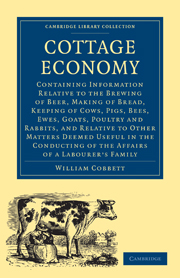Book contents
- Frontmatter
- Contents
- 1 Introduction. To the Labouring Classes of this Kingdom.—Brewing Beer
- 2 Brewing Beer continued
- 3 Making Bread
- 4 Making Bread continued.—Brewing Beer.—Keeping Cows
- 5 Keeping Cows
- 6 Keeping Pigs.—Salting Mutton and Beef
- 7 Bees, Geese, Ducks, Turkeys, Fowls, Pigeons, Rabbits, Goats and Ewes, Candles and Rushes, Mustard. Dress and Household Goods and Fuel, Hops and Yeast
- INDEX
1 - Introduction. To the Labouring Classes of this Kingdom.—Brewing Beer
Published online by Cambridge University Press: 29 August 2010
- Frontmatter
- Contents
- 1 Introduction. To the Labouring Classes of this Kingdom.—Brewing Beer
- 2 Brewing Beer continued
- 3 Making Bread
- 4 Making Bread continued.—Brewing Beer.—Keeping Cows
- 5 Keeping Cows
- 6 Keeping Pigs.—Salting Mutton and Beef
- 7 Bees, Geese, Ducks, Turkeys, Fowls, Pigeons, Rabbits, Goats and Ewes, Candles and Rushes, Mustard. Dress and Household Goods and Fuel, Hops and Yeast
- INDEX
Summary
1. THROUGHOUT this little work, which is intended to be comprised in Six Numbers, I shall number the Paragraphs, in order to be able, at some stages of the work, to refer, with the more facility, to parts that have gone before. The last number will contain an Index, by the means of which the several matters may be turned to without loss of time; for, when Economy is the subject, time is a things which ought by no means to be overlooked.
2. The word Economy, like a great many others, has, in its application, been very much abused. It is generally used as if it meaned parsimony, stinginess, or niggardliness; and, at best, merely the refraining from expending money. Hence misers and close-fisted men disguise their propensity and conduct under the name of Economy; whereas the most liberal disposition, a disposition precisely the contrary of that of the miser, is perfectly consistent with economy.
3. Economy means, management, and nothing more; and it is generally applied to the affairs of a house and family, which affairs are an object of the greatest importance, whether as relating to individuals or to a nation. A nation is made powerful and honoured in the world not so much by the number of its people as by the ability and character of that people; and the ability and character of a people depend, in a great measure, upon the economy of the several families which, all taken together, make up the nation. There never yet was, and never will be, a nation permanently great, consisting, for the greater part, of wretched and miserable families.
- Type
- Chapter
- Information
- Cottage Economy , pp. 1 - 24Publisher: Cambridge University PressPrint publication year: 2009First published in: 1822



